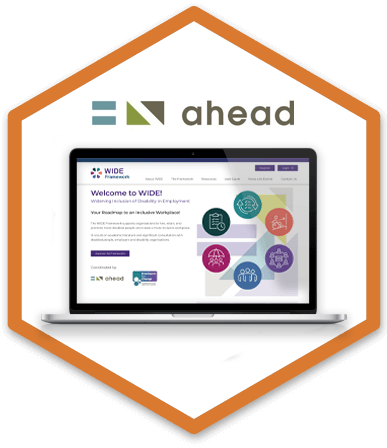Case study brief: Building a self-assessment inclusion Framework
AHEAD is an independent non-profit organisation working with and for disabled people. Their mission is to shape inclusive and empowering environments in tertiary education and employment.
Working in collaboration with Employers for Change, their project goal was to develop an interactive digital tool, designed to help with ‘Widening Inclusion of Disability in Employment (WIDE)’ across the Island of Ireland. The platform provides structured self-assessment, collaboration, and benchmarking features to guide organisations on evaluating and improving the inclusivity of their workplaces.
Developing an advanced system with complex functionality made this case study stand out
This project stood out for our experts, due to the technical complexity behind its seamless user experience.
Combining a custom database architecture, multiple API integrations, dynamic visualisations, and advanced WordPress functionality, brought this platform to life. In turn, delivering a robust, data-driven, and highly interactive Framework. What’s more is, the system has been built to meet Web Content Accessibility Guidelines (WCAG) Level AA standards, ensuring all organisations can effectively utilise the benchmarking tool.
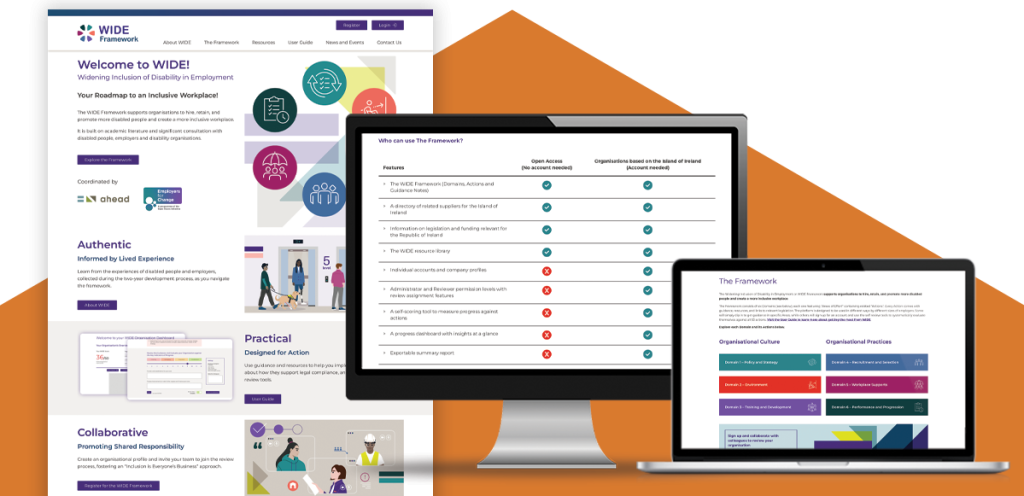
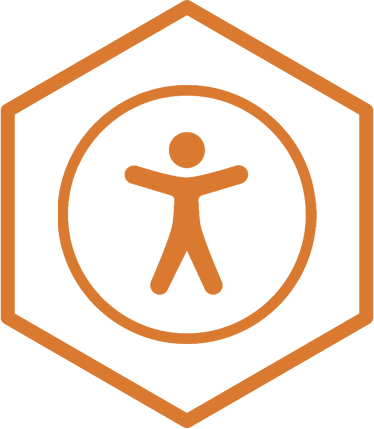
Accessible web design and development action
- Advanced Framework design and development
- Interactive data visualisation creation
- Built to Web Content Accessibility Guidelines (WCAG) 2.2 AA standards
- User testing sessions
- Project management and accessibility consultancy
- Delivery of Content Editor Training
The WIDE Framework

The Widening Inclusion of Disability in Employment (WIDE) Framework supports organisations on the Island of Ireland to hire, retain, and promote more disabled people in the workplace. This interactive, feature-packed platform and self-review tool is designed to be a road map to an inclusive workplace culture for organisations who want to systematically improve in this area. But the Framework also serves as a place for employers to dip into for specific guidance in a searchable resource library or look for a supplier to partner with around the Framework actions.
Designing the advanced Framework
Being a standalone Framework, separate from the main AHEAD website, we began the design process by giving the platform its own unique identity.
The WIDE Framework is built around seven themed domains:
- Policy and Strategy
- Environment
- Training and Development
- Recruitment and Selection
- Workplace Supports
- Performance and Progression
This inspired the vision behind WIDE’s new logo. Taking six colours from the logo empowered us to give each of the domains a clear visual distinction, creating colour schemes that flowed fluently between each of the individual areas.

Using custom WordPress post types and taxonomies, our web development experts could structure the content and group the domains with tailored areas of effort and actions. Specific actions then had their own offshoot of pages, guiding users to a range of practical guidance, resources, and legislation to help improve performance.
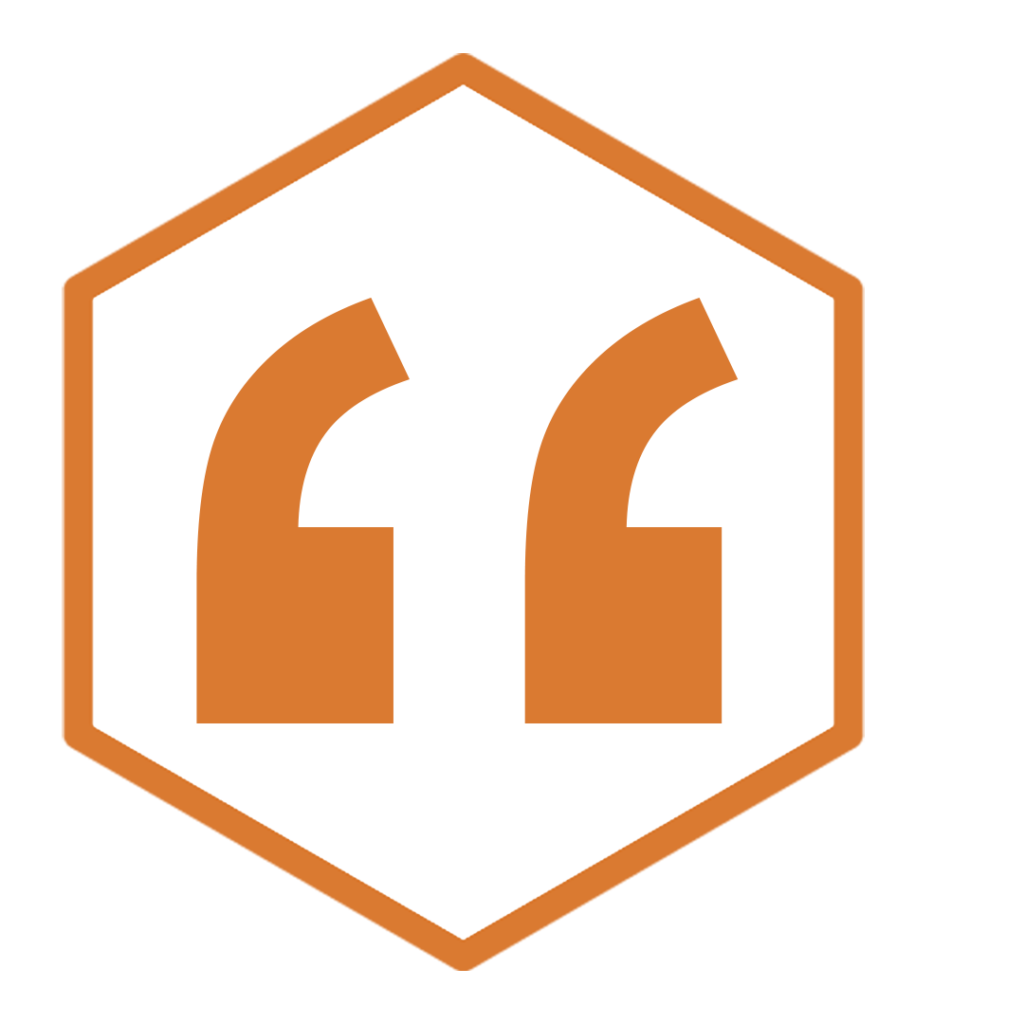
HeX’s ‘accessibility-first’ ethic was really evident at every stage of the process, and they helped us to make design decisions that prioritised accessibility without compromising on visual aesthetics.
Dara Ryder: AHEAD, CEO
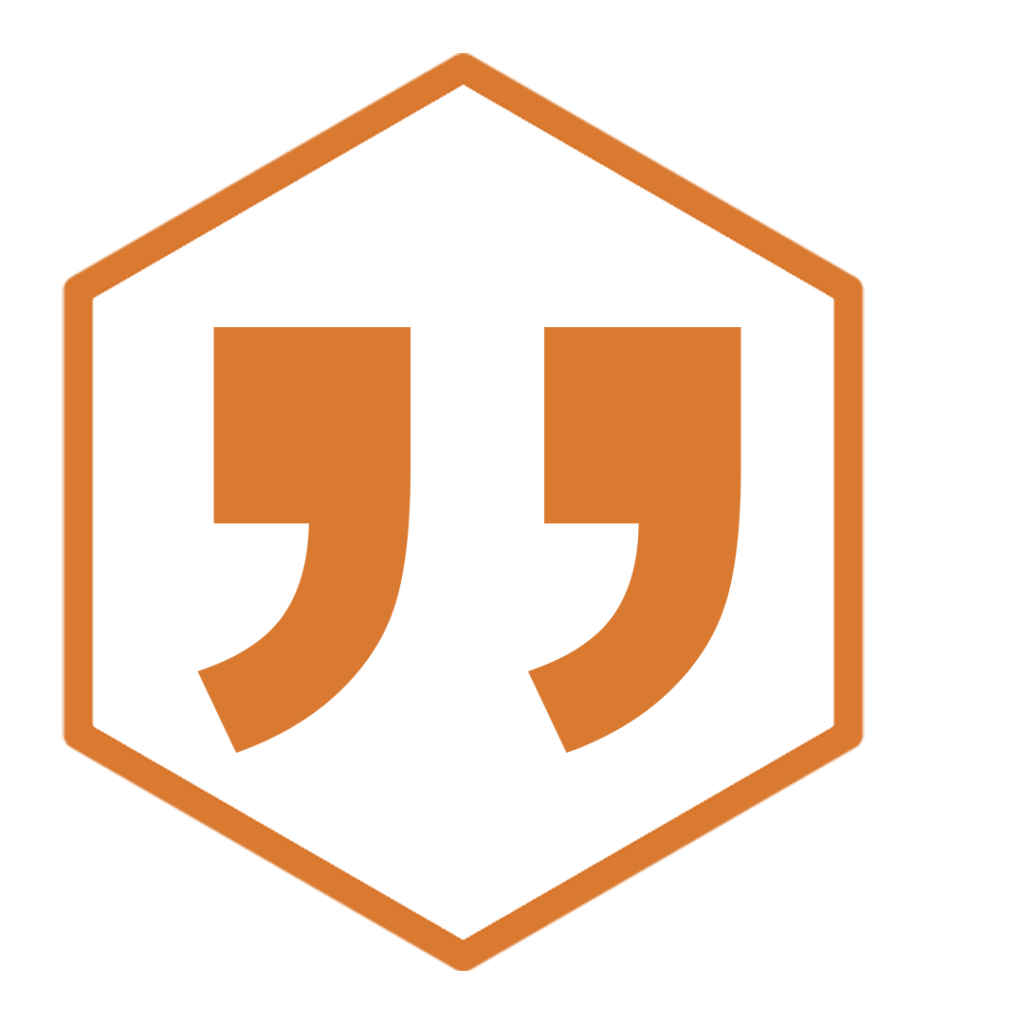
Stringent registration and verification processes
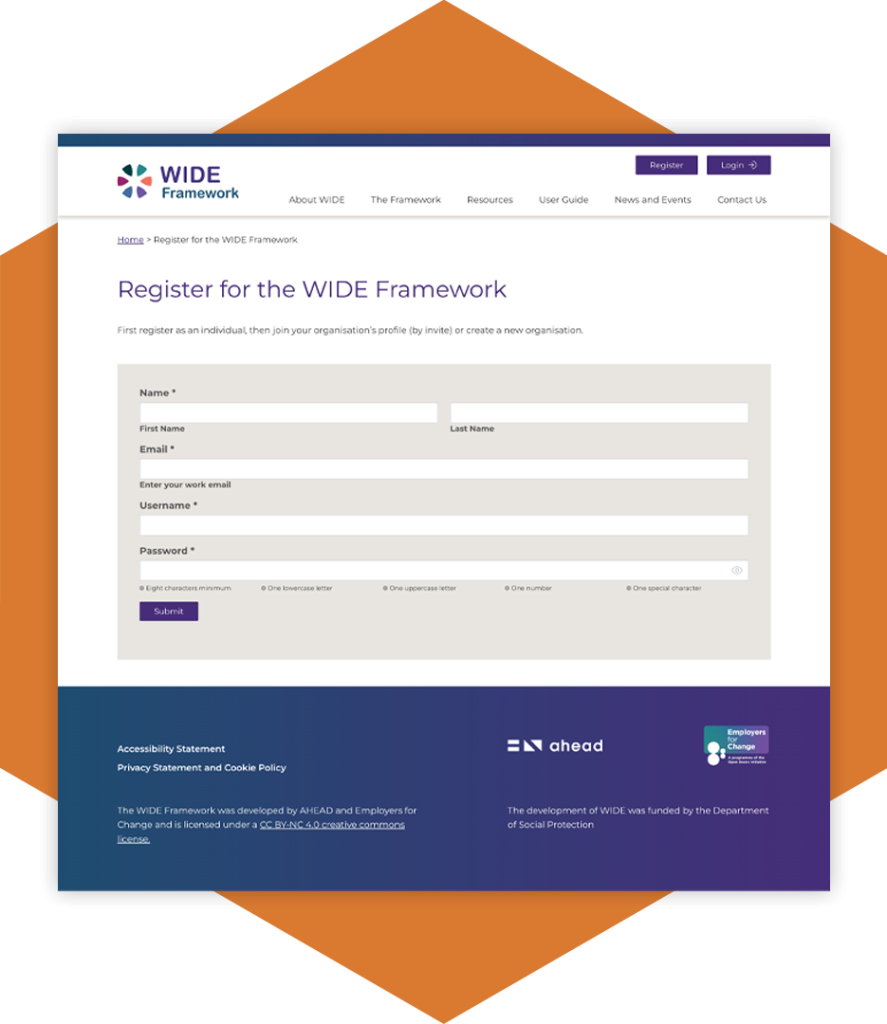
To restrict access to eligible organisations, our team developed a custom registration process using Formidable Forms. The system is created to verify each registration through several validation checks, including:
- Prevention of duplicate organisation names.
- Google Maps APIs assessing if EIRcodes or postcodes are correct and are in the Republic of Ireland or Northern Ireland.
- Ensuring domains from an organisation’s website or email is not associated with an existing organisation to avoid duplication of registrations.
Once the form passes all checks, a new organisation profile is automatically created, and the user becomes the organisation’s administrator. This admin then has access to a custom form, giving them the power to invite colleagues to join and assign them roles as either reviewers or co-admins.
Effortless organisation management
User and organisation management is handled using the Groups plugin, which provides the backbone for role-based access. Administrators can invite new members directly from their organisation dashboard within the system and select their level of access.
Invited users then receive a secure email, with a registration link and details of their membership. Once selected, users will automatically be directed to a pre-populated login page to confirm their registration.
Organisation admins have the ability to easily promote or demote user roles, remove members, and re-send invitations when needed. This puts the power in the organisation’s hands, making it effortless to manage access and ensure any sensitive data remains secure.
Building a roadmap to an inclusive workplace
Each action page throughout the Framework includes an embedded Formidable Form. This allows organisations to perform a self-assessment of their performance, which is rated against the guidance provided within each action.
This includes an area to:
- Score their organisation.
- Provide supportive evidence.
- Specify any improvements or actions that can be taken to increase the score.
- Confirm the completion of the action.
All submissions are transferred and saved to a custom database table for accurate tracking and data analysis. The results are then displayed on the Organisation Dashboard.
For organisational admins within the dashboard, here they can allocate designated colleagues to any actions that need to be reviewed or prompt users who need to begin the self-assessment process. Combining the use of an event listener on each of the form’s checkboxes and WordPress’ API, the reviewer’s data is then saved within the post meta and displayed in the action template.
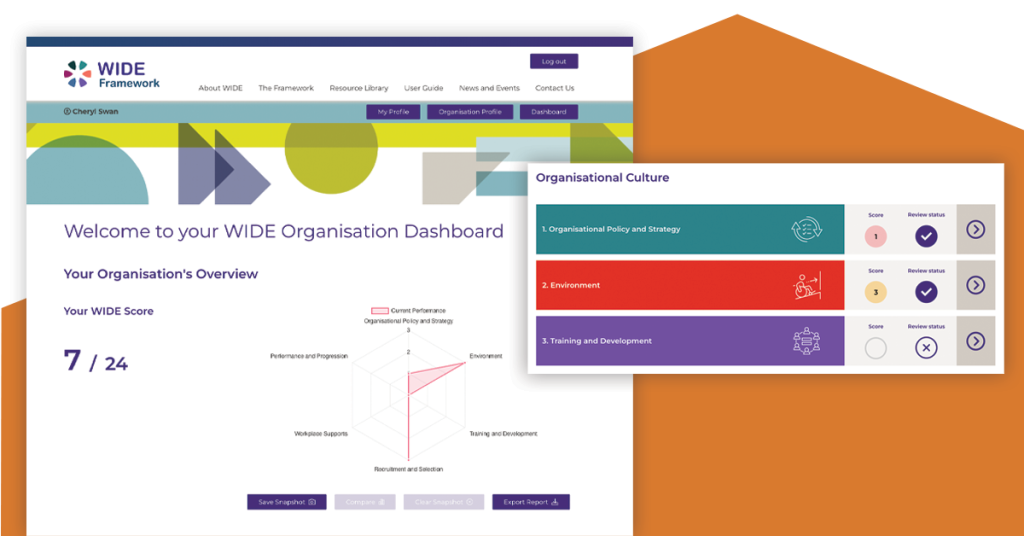
Using ChartJS, the dashboard generates a striking visualisation in the form of a radar chart to display accurate scoring of domain levels. Data contained within accordion elements uses a combination PHP, HTML, and Javascript to deliver scoring levels on individual actions, areas of effort, and broader domains. Utilising WordPress Transients allows users to take a snapshot of their current performance, enabling organisations to compare their progress against any future improvements and help in planning their next steps more effectively.
Providing organisational support through the Resource Library and Supplier Directory
To complement the self-assessment Framework, the platform includes a Resource Library that brings together an array of relevant supporting materials. To enhance accessibility and ease of use, the library has robust search and filter capabilities and a Virtual Select plugin to better assist users who may struggle to use multi-select dropdown menus on devices, such as tablets and mobiles. Contributors to the platform also have the ability to submit new resources by third parties via a form. Behind the scenes, submitted form entry data is converted and automatically mapped directly into WordPress. This creates a draft post for the WIDE team to perform an internal review before choosing if they wish to publish the content and add it to the Resource Library.

Using a similar process, our team created a Supplier Directory. This useful addition enables organisations to find inclusion-focused service providers to partner with surrounding any of the Framework actions. As the Framework grows, this directory will become an important networking tool for collaboration and knowledge sharing.
User testing and upskilling training
User testing was an integral part of the project. During three stages of the design and development of the Framework, testing was carried out with end users to assess the platform’s:
- Site structure, page layout, and navigation.
- Features, with a focus on the registration and self-assessment reviewing processes.
- Functions, ensuring clients, end users, and the agency team could smoothly perform all required actions.
Each round of user testing provided valuable insights and recommendations from real users. This feedback helped in making improvements and informed decision-making surrounding the design and functionality of the platform, leading to a more refined and user-friendly final product.
Upon completing the development work, our team gave upskilling training to the AHEAD team. This content editor training session gave thorough walkthroughs on how to effectively use the backend of the system, giving them the confidence to update and maintain the site once the Framework went live.

The team at Hex were fantastic to work with. They had such a ‘can-do’ attitude and no design challenge we posed was too big or complex to attempt. They were patient with us throughout and helped us to understand the technical aspects of the project in plain English. They were great fun to work with.
Dara Ryder: AHEAD, CEO

Successful delivery of the WIDE Framework
Developing the WIDE Framework was a rewarding project that combined technical depth with social impact.
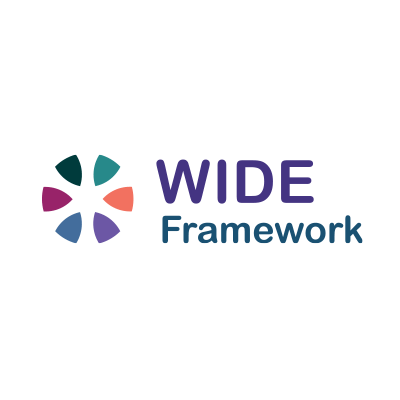

Working together, we successfully delivered a secure, accessible, and data-driven platform that empowers Irish organisations to measure and improve the inclusivity of their workplaces.
The system’s intuitive user experience and role-based tools encourage ongoing engagement and team participation. With the Resource Library and Supplier Directory also creating a growing collaborative space that connects organisations, promotes learning, and supports continuous improvement.
Organisations in the Island of Ireland now have the data, tools, and resources at their fingertips to assist in Widening Inclusion of Disability in Employment.
We look forward to working further with the AHEAD team on future phases of the Framework and providing ongoing maintenance support.
More case studies about accessible web development
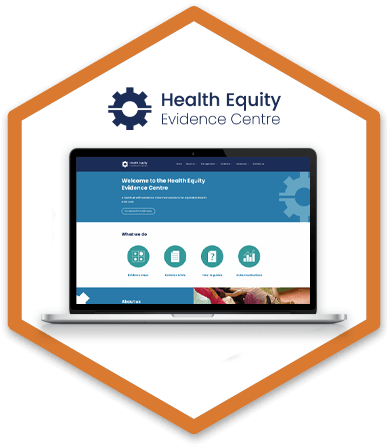
Health Equity
Our team inclusively developed a data-driven and user-friendly digital Evidence Centre. The site generates innovative insights for addressing inequalities in and through primary care.
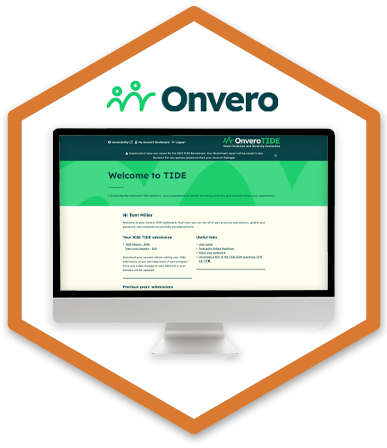
Onvero
Our experts developed an enhanced benchmarking self-assessment tool, named TIDE, to help organisations embed and sustain an inclusive workplace culture.

